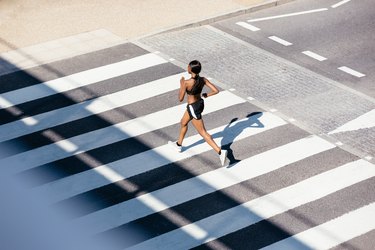
It's important to nourish yourself properly before engaging in vigorous aerobic activity such as running. However, it's a good idea to wait a little while after eating a meal before you lace up your sneakers.
Running directly after you eat can leave you with a bloated feeling, diminishing your performance. In worse cases, interrupting your body's digestive process with sudden intensive activity can cause diarrhea or stomach pains.
Video of the Day
Video of the Day
Read more: How Long After You Eat Can You Work Out?
Wait Time and Meal Size
How long you should wait to run depends on how much you've eaten and your own digestive system. As a general rule, give yourself at least an hour after a small snack, two to three hours after a small meal and three to four hours after a large meal.
If you like to take a run at a specific time, such as during your lunch break or in the evening, change your eating schedule to accommodate the exercise. For example, eat a hearty breakfast when you get up and just have a banana, a yogurt or an energy bar about an hour before your lunchtime run.
Mayo Clinic suggests having post-run snacks as well — like yogurt and fruit, a peanut-butter sandwich or a smoothie — that will replenish the glycogen stores in your muscles.
Carb-Loading Before Running
If you're looking to optimize your running performance, try carb-loading, a dietary practice common among competitive athletes, says ACE Fitness. To carb-load, you consume a higher quantity of carbohydrates during the days leading up to a game or competition. The practice is designed for longer endurance activities, so if you usually run 10 miles or less, you needn't add on the extra starch.
If you do decide to carb-load, follow the general rule of advice about waiting between mealtime and running time. Select whole-grain carbs for maximum nutrients. To avoid weight gain, balance the extra carb consumption with reduced servings of fats or sweets.
Read more: Is It Better to Eat Before or After Jogging?
Hydrate Yourself Well
Runners shouldn't just attend to their solid food intake; what you drink is just as important to your fitness and performance. For some individuals, having a sports drink before a run can substitute for a light snack, supplying plentiful energy well after the last meal. Drinking plenty of fluids is vital for keeping your body hydrated. Even on cool days, going for a run will increase your body's need for hydration.
Drink at least 1.5 to 2.5 cups of water for runs of an hour or less. Opt for sports drinks containing sodium when you run for longer periods. Drinking right before you run is unlikely to cause the indigestion that food could. However, if running immediately after drinking causes discomfort, just keep yourself hydrated throughout the day, before and after your run says Go Ask Alice.
Avoid Runner's Diarrhea
If you experience runner's diarrhea, don't eat anything at all for at least two hours prior to your next run. During the 24 hours pre-run, adjust your diet, cutting out high-fiber foods, artificial sweeteners, caffeine, warm liquids and fatty foods. In consultation with your doctor, reintroduce these foods into your pre-run diet gradually, checking which foods affect your condition.